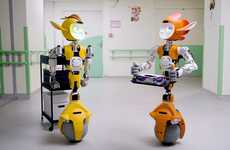
'Darwin' Provides Robot Therapy to Children with Cerebral Palsy
Laura McQuarrie — February 25, 2017 — Tech
'Darwin' is the name of a robot therapy tool developed by researchers at the Georgia Institute of Technology specifically for children and adults who are living with Cerebral Palsy.
Rather than using conventional methods of therapy, Darwin provides words of encouragement and games to lift a patient's spirits and as a result, help them to increase their efforts and desire to succeed in their therapy.
Across the healthcare industry, a number of bots are being introduced to enhance the kind of care that can be given by human medical professionals. A number of these bots are designed to take care of both labor-intensive and mundane tasks that can be outsourced to a robot, thus leaving a medical professional more time to focus their efforts elsewhere.
Rather than using conventional methods of therapy, Darwin provides words of encouragement and games to lift a patient's spirits and as a result, help them to increase their efforts and desire to succeed in their therapy.
Across the healthcare industry, a number of bots are being introduced to enhance the kind of care that can be given by human medical professionals. A number of these bots are designed to take care of both labor-intensive and mundane tasks that can be outsourced to a robot, thus leaving a medical professional more time to focus their efforts elsewhere.
Trend Themes
1. Robot Therapy Tools - Developing robot therapy tools like 'Darwin' presents a disruptive innovation opportunity in the healthcare industry for improved patient care and motivation.
2. Enhanced Healthcare Bots - The introduction of healthcare bots presents a disruptive innovation opportunity for automating labor-intensive and mundane tasks, allowing medical professionals to focus on more critical areas.
3. Personalized Therapeutic Experiences - Creating personalized therapy experiences using robots, such as providing words of encouragement and interactive games, can enhance patient motivation and lead to improved therapy outcomes.
Industry Implications
1. Healthcare Industry - Introducing robot therapy tools offers disruptive innovation opportunities to improve patient care, automate tasks, and enhance therapy outcomes in the healthcare industry.
2. Robotics Industry - The development and deployment of robot therapy tools like 'Darwin' present disruptive innovation opportunities for the robotics industry to cater to specific therapeutic needs and enhance human-robot interactions.
3. Assistive Technology Industry - Leveraging robot therapy tools in the assistive technology industry can bring about disruptive innovation by offering new solutions for individuals with cerebral palsy and other disabilities to enhance their quality of life.
3.5
Score
Popularity
Activity
Freshness























